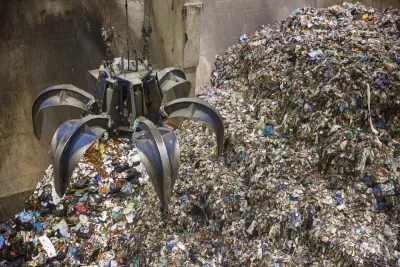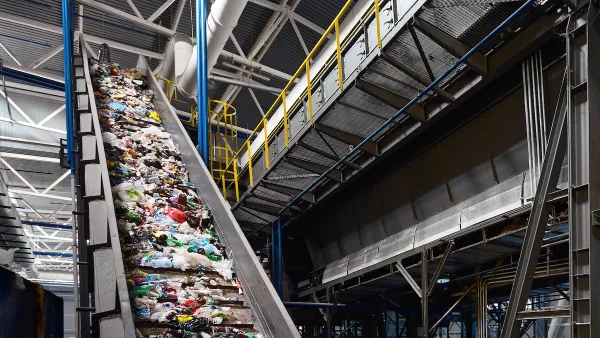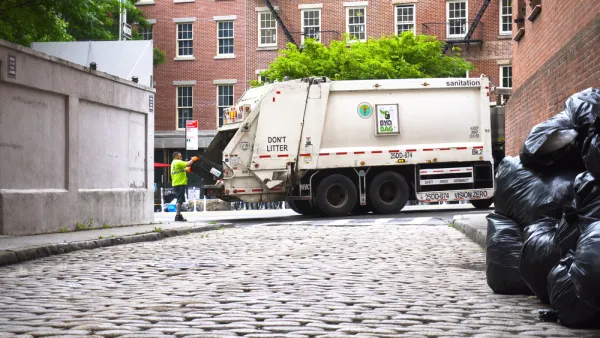China's decision to halt imports of most recyclables from the United States has caused turmoil. With few markets for their recyclables, Philadelphia is sending half of them to a waste-to-energy incinerator in Chester not designed to burn them.

[Updated March 5, 2019]
The problem started last May when China abruptly halted accepting recyclables from U.S. markets unless they were free of contamination, a standard few recyclers can meet. Without the China market, municipalities have had to scramble to find alternative outlets.
"There isn’t much of a domestic market for US recyclables – materials such as steel or high-density plastics can be sold on but much of the rest holds little more value than rubbish – meaning that local authorities are hurling it into landfills or burning it in huge incinerators," writes Oliver Milman, an environment reporter for The Guardian.
In Philadelphia, half of the city's recyclables have been sent to the Covanta Delaware Valley Resource Recovery Facility, a waste-to-energy facility, also known as an incinerator, located in Chester, a largely African American community of 34,000 residents, and what many environmentalists would call a classic case of environmental injustice.
Some experts worry that burning plastic recycling will create a new fog of dioxins that will worsen an already alarming health situation in Chester.
Nearly four in 10 children in the city have asthma, while the rate of ovarian cancer is 64% higher than the rest of Pennsylvania and lung cancer rates are 24% higher, according to state health statistics.
The facility, which generates up to 87 megawatts of electricity, is the fourth largest waste-to-energy facility in the nation. According to the U.S. Energy Information Administration, in 2015, there were "71 waste-to-energy (WTE) plants that generated electricity in 20 U.S. states, with a total generating capacity of 2.3 gigawatts."
According to Waste360, about half of the waste-to-energy facilities are privately owned while the rest are publicly-owned. The bulk of the privately owned facilities, as well as many of the public facilities, are operated either by Covanta Energy or Wheelabrator Technologies.
Covanta "argues that incineration is a better option than simply heaping plastic and cardboard in landfills," adds Milman.
“In terms of greenhouse gases, it’s better sending recyclables to an energy recovery facility because of the methane that comes from a landfill,” said Paul Gilman, Covanta’s chief sustainability officer. “Fingers crossed Philadelphia can get their recycling program going again because these facilities aren’t designed for recyclables, they are designed for solid waste.”
Frank Kummer, an environment reporter for The [Philadelphi] Inquirer, exposed the city's diversion of recyclables to Covanta on Jan. 29. The level of contamination in its recyclables was the determining factor why it lost access to the China export market.
Philadelphia’s contamination rate is anywhere from 15 percent to 20 percent. That meant its previous contractor for recycling, Republic Services, had to find other markets for processing or begin disposing of portions of contaminated loads in other ways, such as in landfills or by incineration.
[Update: Covanta, the company that owns and operates the waste-to-energy facility in Chester, Penn., refutes many of the claims made in the source article. They strongly assert that they run the facility in "a manner that is protective of human health and the environment." Readers are encouraged to click on "A Message From Covanta."
Related in Planetizen:
-
Waste-to-Energy Plants, or Incinerators, Make Comeback, January 13, 2015
-
Can America Salvage Its Waste-to-Energy Opportunities? July 29, 2013
FULL STORY: Moment of reckoning': US cities burn recyclables after China bans imports

Analysis: Cybertruck Fatality Rate Far Exceeds That of Ford Pinto
The Tesla Cybertruck was recalled seven times last year.

National Parks Layoffs Will Cause Communities to Lose Billions
Thousands of essential park workers were laid off this week, just before the busy spring break season.

Retro-silient?: America’s First “Eco-burb,” The Woodlands Turns 50
A master-planned community north of Houston offers lessons on green infrastructure and resilient design, but falls short of its founder’s lofty affordability and walkability goals.

Test News Post 1
This is a summary

Analysis: Cybertruck Fatality Rate Far Exceeds That of Ford Pinto
The Tesla Cybertruck was recalled seven times last year.

Test News Headline 46
Test for the image on the front page.
Urban Design for Planners 1: Software Tools
This six-course series explores essential urban design concepts using open source software and equips planners with the tools they need to participate fully in the urban design process.
Planning for Universal Design
Learn the tools for implementing Universal Design in planning regulations.
EMC Planning Group, Inc.
Planetizen
Planetizen
Mpact (formerly Rail~Volution)
Great Falls Development Authority, Inc.
HUDs Office of Policy Development and Research
NYU Wagner Graduate School of Public Service



























